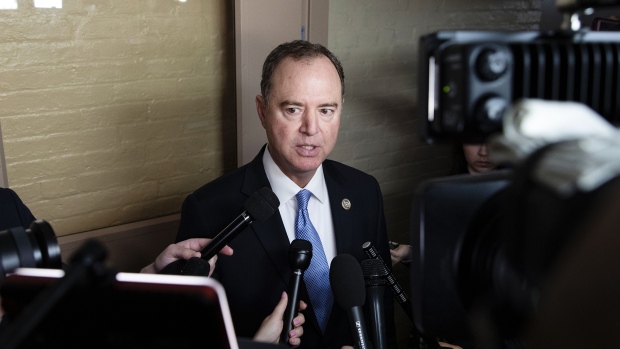Jun 13, 2019
Schiff Calls ‘Deepfakes’ a Nightmarish Threat to 2020 Elections
, Bloomberg News

(Bloomberg) -- A top House Democrat warned that “deepfakes” -- audio and video fabricated to depict people saying or doing things they never said or did -- may lead to “nightmarish scenarios” during the 2020 political campaigns.
“Now is the time for social-media companies to put in place policies to protect users from misinformation, not in 2021 after viral deepfakes have polluted the 2020 elections,” Intelligence Committee Chairman Adam Schiff of California said at a hearing on Thursday. He said Congress needs to understand the implications of deepfakes and artificial intelligence that can be used to produce them.
The election-related concerns have been spurred in part by Russian “trolls” that spread divisive posts during the 2016 campaign. The final report by Special Counsel Robert Mueller described how a Russian entity “carried out a social media campaign that favored presidential candidate Donald J. Trump and disparaged presidential candidate Hillary Clinton.”
Schiff said the U.S. recently got a preview of the latest in potential abuses, when a doctored video of House Speaker Nancy Pelosi went viral on Facebook, receiving millions of views over 48 hours. The video was slowed to make her voice appeared slurred and distorted. Pelosi declined to take calls from Facebook Inc. Chief Executive Officer Mark Zuckerberg after the social-media giant refused to take down the video, instead attaching a note that third-party fact-checkers found it false.
The Pelosi video’s anonymous producers didn’t take advantage of artificial intelligence, Schiff said, but it showed how even crude manipulations can go viral on social media.
“Thinking ahead to 2020 and beyond, one does not need any great imagination to envision even more nightmarish scenarios that would leave the government, the media, and the public struggling to discern what is real and what is fake," he said.
He tossed out such possibilities as:
- A state-backed actor creating a deepfake video of a political candidate accepting a bribe.
- Fake audio is released of a purportedly hacked private conversation between two world leaders that never took place.
- A troll farm uses text-generating algorithms to write false or sensational news stories, flooding social-media platforms.
The Intelligence panel’s top Republican, Devin Nunes of California, agreed deepfakes pose a concern. The combative Nunes, who’s often targeted for criticism on social media, Nunes prompted some laughter when he said, “This is real, because you can go online and see pictures of yourself.”
The law currently exempts online platforms such as Facebook for most content its users post, but Danielle Citron, a law professor at the University of Maryland who testified, said the immunity should be preserved only for those that employ "reasonable content moderation practices."
"There are some sites that literally traffic in abuse, that encourage illegality, but they should not enjoy immunity from liability," Citron said, adding that she has advised Facebook and Twitter Inc. as best practices have emerged in recent years.
To contact the reporters on this story: Billy House in Washington at bhouse5@bloomberg.net;Ben Brody in Washington at btenerellabr@bloomberg.net
To contact the editors responsible for this story: Kevin Whitelaw at kwhitelaw@bloomberg.net, Larry Liebert, Joshua Gallu
©2019 Bloomberg L.P.





